Christians in Asia
That Christians in Asia, bearing witness to the Gospel in word and deed, may promote dialogue, peace, and mutual understanding, especially with those of other religions.
For more information, visit the Apostleship of Prayer.
That Christians in Asia, bearing witness to the Gospel in word and deed, may promote dialogue, peace, and mutual understanding, especially with those of other religions.
For more information, visit the Apostleship of Prayer.
On November 21 (the Presentation of the Blessed Virgin Mary in the Temple), the Church will celebrate World Day of Cloistered Life, also known as “Pro Orantibus” Day, which is a Latin phrase meaning “for those who pray.” This is an important ecclesial event for all Catholics worldwide to commemorate the hidden lives of consecrated religious in cloisters and monasteries.
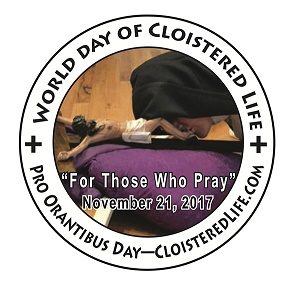
We celebrate this day because the contemplative life is a gift from Almighty God to us all — all the world benefits spiritually from the prayer and sacrifice of these dedicated and faithful souls, even when we may not know it. On this day, the faithful are encouraged to reach out to the cloistered and contemplative communities in their diocese, through prayer, encouragement, and material support.
Please click at the link for more info and for resources: //www.cloisteredlife.com/news/pro-orantibus-day/
That all workers may receive respect and protection of their rights, and that the unemployed may receive the opportunity to contribute to the common good.
For more information, visit the Apostleship of Prayer.
Saint Paul in his epistle to the Hebrews writes that the Christian virtue of “Hope” is set before us as “an anchor of the soul, sure and firm.” (cf. Heb 6:19) The anchor of a ship is that substantial piece of equipment that when thrown down, grabs hold of the solid sea bed below. The winds may blow and the waves crash about, but the anchor provides security and stability until the skies clear and the waves calm.
The community of religious brothers called the Brotherhood of Hope was founded in 1980 by Father Philip Merdinger. With their motto as “Primum Deus, Deus Solum”, Latin for “God First, God alone”, this community based in Boston, MA wears on their habit the Anchor.
With 18 young men in Brotherhood formation as of this writing, these serious, yet joyful men prepare to labor in the harvest of the Lord with a zeal for the “lost sheep”, particularly college students and young adults who are especially vulnerable to being lost in the storms of the increasingly secularized and hostile culture with its many allurements and distractions.
From the earliest days of the Church, the Anchor has served as a powerful symbol of Hope in Christ our Resurrected Savior and His promise of eternal salvation, with countless examples found on the epitaphs of the faithful departed within the catacombs in Rome.
The important work of the Brothers is that in their apostolate, in their fidelity to Christ and to the Church and their works of mercy, they inspire Hope and demonstrate the “freedom of the glory of the children of God” (Rom 8:21)
That our parishes, animated by a missionary spirit, may be places where faith is communicated and charity is seen.
For more information, visit the Apostleship of Prayer.
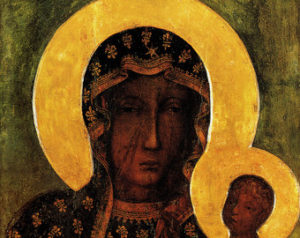 This weekend the Church celebrated the Feast of Our Lady of Czestochowa. This feast commemorates the famous icon of Our Lady that, according to legend, was painted by St. Luke at the house of the Holy Family. The icon ended up in Constantinople due to the efforts of St. Helena, and then was brought to Poland before the fall of Constantinople in the 15th century. The icon became the spiritual heart of the Poles, reminding them of Mary’s maternal care through the hardships of their history. In 1979, shortly after becoming Pope, Saint John Paul II traveled to Poland in what has been remembered as the “Nine Days That Changed the World.” On that trip, he went to Jasna Gora, the home of Our Lady of Czestochowa, and reminded the Poles to consecrate “everything through Mary.” He urged them to give over to Mary’s maternal heart all their sufferings, sacrifices, and hopes. Only in Her, who is rooted in the Son, will they find the liberation they were seeking, the freedom grounded in authentic self-gift that only Christ can give.
This weekend the Church celebrated the Feast of Our Lady of Czestochowa. This feast commemorates the famous icon of Our Lady that, according to legend, was painted by St. Luke at the house of the Holy Family. The icon ended up in Constantinople due to the efforts of St. Helena, and then was brought to Poland before the fall of Constantinople in the 15th century. The icon became the spiritual heart of the Poles, reminding them of Mary’s maternal care through the hardships of their history. In 1979, shortly after becoming Pope, Saint John Paul II traveled to Poland in what has been remembered as the “Nine Days That Changed the World.” On that trip, he went to Jasna Gora, the home of Our Lady of Czestochowa, and reminded the Poles to consecrate “everything through Mary.” He urged them to give over to Mary’s maternal heart all their sufferings, sacrifices, and hopes. Only in Her, who is rooted in the Son, will they find the liberation they were seeking, the freedom grounded in authentic self-gift that only Christ can give.
Poland is a country that not only sees its history through the lens of Providence but a land where it is very common to find people who see their own particular histories through the dynamics of the Faith. Dedication to Mary is part of that. It begins in the home, especially through daily recitation of the Rosary and simple acts of consecration to Mary at a young age. Religious vocations flourish in such a culture because life is interpreted as bring from and for God, encouraging the youth to make Mary’s “fiat” an integral part of their lives. The vow of consecration and the vow of marriage are seen as participations in Mary’s way of life who is both Virgin and Spouse. The Institute on Religious Life has a special devotion to Mary since she is the Mother of Vocations. Each day we should pray through Mary for vocations, and we should look to Our Lady of Czestochowa for help and guidance.
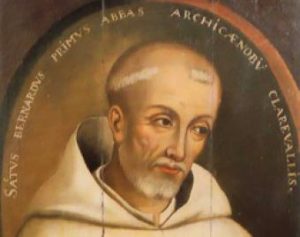 St. Bernard of Clairvaux inspired many vocations to the newly founded Cistercian Order. Famously, he managed to bring his uncle, his brothers, and a group of young nobleman to the same vocation. He even convinced his sister to leave her husband and become a nun. His charisma transformed Europe in the 12th Century. Benedictine Jean Leclercq, O.S.B. (1911-1993), known for his magisterial The Love of Learning and the Desire for God, wrote this informative paragraph as part of an introduction to Bernard of Clairvaux: Selected Works (this paragraph shows you how much a contemplative can do):
St. Bernard of Clairvaux inspired many vocations to the newly founded Cistercian Order. Famously, he managed to bring his uncle, his brothers, and a group of young nobleman to the same vocation. He even convinced his sister to leave her husband and become a nun. His charisma transformed Europe in the 12th Century. Benedictine Jean Leclercq, O.S.B. (1911-1993), known for his magisterial The Love of Learning and the Desire for God, wrote this informative paragraph as part of an introduction to Bernard of Clairvaux: Selected Works (this paragraph shows you how much a contemplative can do):
“In 1115, just three years following his arrival at Citeaux, Bernard was sent to found a monastery at Clairvaux in Champagne, to which he led his brothers and companions, and attracted many other young men as well. Soon he was in a position to make other foundations, in 1118, 1119, 1121, and almost every year after that. He made 68 foundations in thirty-five years and was the principal promoter of his Order, which, at the time of his death, comprised some 350 houses, of which 164 were answerable more or less directly to his authority. They extended across the whole of Europe, from Scandinavia to southern Portugal, from northern England to central Europe. A spiritual motivation had to be ensured in each monastery, beginning with the motherhouse. It has been estimated that between 800 and 900 monks had been part of the community of Clairvaux before Bernard’s death. Some of them were sent to daughterhouses that, in turn, made other foundations. Thus, there were thousands of men, generally young, who left society and often a military career to take up cloistered life. If to this number one adds the members of some 290 other Cistercian monasteries founded during Bernard’s lifetime, one has some idea of the tremendous peace corps, with tens of thousands of members, that Bernard helped to establish. What architect of peace has played such a role in his century or in any other?”
 Many people have a vocation to the religious life but simply do not know that the religious life exists or what it is. I find that many of my students never heard of the religious life. They think that everyone gets married with the exception of the parish priest, and once they learn that it is not that narrow they are confused why anyone would live that way. This is why now is moment to catechize the young on the nature of the religious life and give them resources to help them discover an order suited to their vocation.
Many people have a vocation to the religious life but simply do not know that the religious life exists or what it is. I find that many of my students never heard of the religious life. They think that everyone gets married with the exception of the parish priest, and once they learn that it is not that narrow they are confused why anyone would live that way. This is why now is moment to catechize the young on the nature of the religious life and give them resources to help them discover an order suited to their vocation.
Many youth sense that they are not called to marriage and family. Most girls sense that that is their only option, other than single life. Boys know about the diocesan priesthood but do not know where to look if they feel called to something more. I try to present the religious orders to my students to make sure that they know all the charisms to which they may be called. Soren Kierkegaard grew up in a Protestant country that did not have active religious orders. Famously, Kierkegaard called off his marriage. He sensed that he was not called to the married state. Most likely, if he lived in a Catholic culture he would have become a religious. However, that was not available to him. While America has religious orders, the Catholicism most American teenagers grow up in is without religious. In order to serve them and them find their place in the Church, we must introduce them to the religious life. That is partially why the Institute on Religious Life exists. Consider becoming a member of the Institute to help us foster a growing awareness of religious life, especially amongst the young.
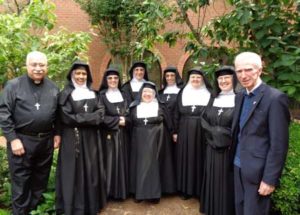 We have just celebrated the Feast Day of St. Jane Frances de Chantal on Saturday, so it is wonderful to learn of the recent election results from the Assembly of the First Federation of the Order of the Visitation held on July 26-28, 2017.
We have just celebrated the Feast Day of St. Jane Frances de Chantal on Saturday, so it is wonderful to learn of the recent election results from the Assembly of the First Federation of the Order of the Visitation held on July 26-28, 2017.
Meeting at the Visitation Monastery in Rockville, Virginia, the Assembly participants elected a new Federation President and Council. Sister Sharon Elizabeth (Toledo, OH) was elected Federation President. She will be assisted by her Council comprised of Mother Rose Marie (Mobile, AL), Mother Marie de Sales (Toledo, OH), Sr. Mary Emmanuel (Tyringham, MA) and Sr. Frances Marie (Rockville, VA). Mother Miriam Rose (Tyringham, MA) and Mother Teresa Maria (Snellvile, GA) were elected as alternate councilors.
St. Jane Frances was the co-foundress of the Order of the Visitation along with St. Francis de Sales. Founded in 1610, in Annecy, Savoy (France), their desire was “to give to God daughters of prayer, and souls so interior that they may be found worthy to serve His infinite majesty and to adore Him in spirit and in truth.”
The Visitation Order was founded for women who could not handle the austerities of the traditional cloistered life but who truly had a call from God to give themselves entirely to God as a spouse of Christ. They also traditionally accept belated vocations (check each community for the information).
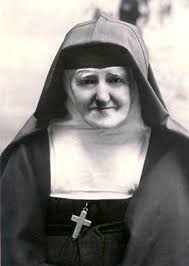 It is sometimes forgotten that St. Thérèse of Lisieux had a fifth sister, Léonie, who was not a Carmelite. Léonie was a difficult child and a poor student who nevertheless desired to enter religious life. Her mother once wrote that unless a miracle was worked, “my Léonie will never enter a religious community.” St. Thérèse predicted that after her death, Léonie would enter the Visitation Order and take her name and that of St. Francis de Sales. Indeed it came to pass. Léonie’s name in religion was Sr. Françoise-Thérèse and her cause for canonization was opened in Caen, France on July 2, 2016, the anniversary of her profession (1900).
It is sometimes forgotten that St. Thérèse of Lisieux had a fifth sister, Léonie, who was not a Carmelite. Léonie was a difficult child and a poor student who nevertheless desired to enter religious life. Her mother once wrote that unless a miracle was worked, “my Léonie will never enter a religious community.” St. Thérèse predicted that after her death, Léonie would enter the Visitation Order and take her name and that of St. Francis de Sales. Indeed it came to pass. Léonie’s name in religion was Sr. Françoise-Thérèse and her cause for canonization was opened in Caen, France on July 2, 2016, the anniversary of her profession (1900).
The six monasteries of the First Federation (which are cloistered) are located in Mobile, AL, Snellville, GA, Rockville, VA, Philadelphia, PA, Tyringham, MA and Toledo, OH. The four highlighted are IRL affiliates.
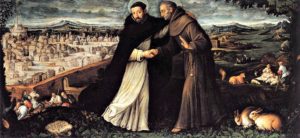
The major religious orders of the first millennium of the Church were monastics. They sought stability outside the false order of the city. Hence, they did not live in cities. But mendicant orders did. They sought to transform the order of the city into the order of Christ, something they witnessed to in radical poverty and preaching. Instead of leaving the City of Man to itself, they would bring the City of God to the City of Man, transforming it from within.
My wife and I were recently in Krakow. At the heart of the city are the Dominicans and the Franciscans (two mendicant orders), which is fitting because the city was founded around the rise of the Mendicant Orders. Maybe that is why the city seems to be alive with Christ. The orders were there to help guide the development of the city. A city is like an organism. It informs its many parts. Its laws, customs, and beliefs lead individuals to the way of life or the way of death. Today we are so accustomed to thinking of ourselves as atomic individuals artificially brought under the influence of the city and its ways. However, this was not so to the medieval mind. For them, everything was interconnected within a natural hierarchy. Some things took precedence to others just as, using an organic analogy, the heart is more important than the limbs. For them, the beliefs of the city were very important, for at issue was its salvation (life) or damnation (death). The spread of heresy within a city was like the spread of a disease. Experts needed to be brought in to help with a cure. The Dominicans answered such a need.
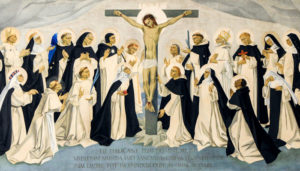
When St. Dominic came to Toulouse in Southern France he was amazed and saddened by the spread of the Albigensian heresy. The lavish lives of the Catholic preachers offended many people, prompting them to turn to the austere heretics. This experience prompted St. Dominic to found the Order of Preachers (Dominicans) who would live austere lives yet preach true Orthodoxy. They would combat heresy with great learning. This was not for the sake of superiority and dominance but the truth. Life lived in the truth is always better than life based on a lie. On this Feast of St. Dominic, let us pray for zealous, well-informed religious who can preach and witness to the Gospel in the heart of the city. The conversion of a city may just happen to begin from the houses of the mendicants like the Dominicans. Theologian C.C. Pecknold agrees. He wrote a great little piece in First Things on what he calls the “Dominican Option”, an alternative to the popular “Benedict Option.” Here is a part of his piece:
Better to speak of the Dominican Option. When I see them in the white habits at prayer, or giving lectures, or playing guitars and banjos on the subway, I have a plausible image of a “contrast society” that is very much engaged with the world—an evangelistic witness which is joyful, intellectually serious, expansive, and charitable.
St. Dominic founded the Order of Preachers after a long contemplative season which, in the words of one biographer “burst into flame” when he encountered Albigensians (ancient Manichean dualists) on travels through southern France. Dominic stayed up all night arguing with one Albigensian, and by morning the man turned away from his heresy and turned towards the Catholic faith. Dominic’s missionary zeal flowed directly out of cloistered contemplation, but it convinced him of the need for a new evangelistic order.
Dominic told his men to go into the world without fear. They should study, they should pray, and they should preach. His Order harmonized the life of a contemplative with the activity of an evangelist. This meant intellectual training. One only needs to think of St. Thomas Aquinas at the University of Paris to understand the impact this had. Dominicans studied other languages, and other religions, in order to preach more effectively. Aquinas himself wrote the Summa Contra Gentiles precisely to assist the brothers’ preaching to Muslims.
This is what we need today as well: the right pattern of formation and evangelistic witness. Not every Christian will be a Dominican, of course. But we all have something fundamental to learn from the Dominican pattern of life.